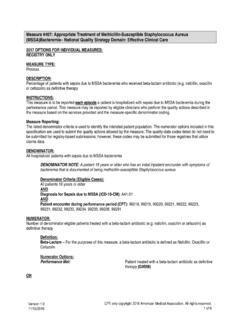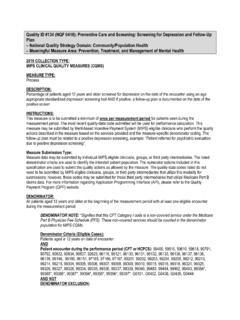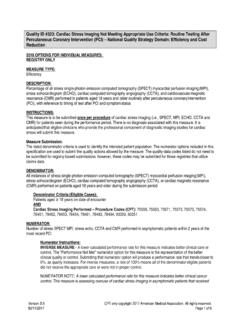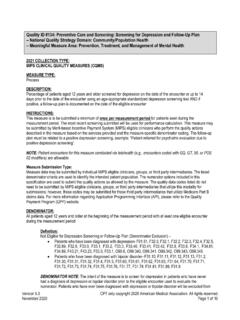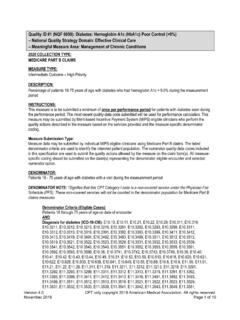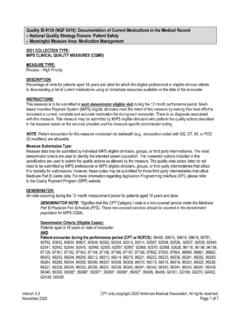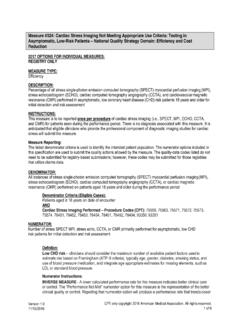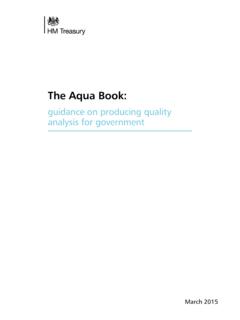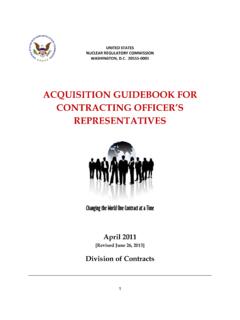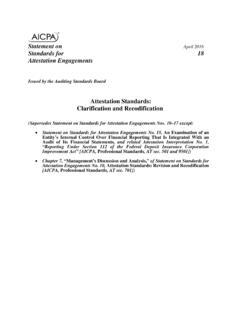Transcription of Quality ID #154 (NQF: 0101): Falls: Risk Assessment
1 Quality ID #154 (NQF: 0101): Falls: Risk Assessment National Quality Strategy Domain: Patient Safety Meaningful Measure Area: Preventable Healthcare Harm 2020 COLLECTION TYPE: MEDICARE PART B CLAIMS. MEASURE TYPE: Process High Priority This is a two-part measure which is paired with Measure #155: Falls: Plan of Care. If the falls risk Assessment indicates the patient has documentation of two or more falls in the past year or any fall with injury in the past year (CPT II code 1100F is submitted), #155 may also be submitted. DESCRIPTION: Percentage of patients aged 65 years and older with a history of falls that had a risk Assessment for falls completed within 12 months INSTRUCTIONS: This measure is to be submitted a minimum of once per performance period for patients seen during the performance period. There is no diagnosis associated with this measure. This measure is appropriate for use in all non-acute settings (with the exception of emergency departments and acute care hospitals).
2 This measure may be submitted by Merit-based Incentive Payment System (MIPS) eligible clinicians who perform the Quality actions described in the measure based on the services provided and the measure-specific denominator coding. Measure Submission Type: Measure data may be submitted by individual MIPS eligible clinicians using Medicare Part B claims. The listed denominator criteria are used to identify the intended patient population. The numerator Quality -data codes included in this specification are used to submit the Quality actions allowed by the measure on the claim form(s). All measure- specific coding should be submitted on the claim(s) representing the denominator eligible encounter and selected numerator option. DENOMINATOR: All patients aged 65 years and older who have a history of falls (history of falls is defined as 2 or more falls in the past year or any fall with injury in the past year). Documentation of patient reported history of falls is sufficient Denominator Criteria (Eligible Cases): Patients aged 65 years on date of encounter AND.
3 Patient encounter during the performance period (CPT or HCPCS): 92540, 92541, 92542, 92548, 97161, 97162, 97163, 97164, 97165, 97166, 97167, 97168, 99201, 99202, 99203, 99204, 99205, 99211, 99212, 99213, 99214, 99215, 99304, 99305, 99306, 99307, 99308, 99309, 99310, 99324, 99325, 99326, 99327, 99328, 99334, 99335, 99336, 99337, 99341, 99342, 99343, 99344, 99345, 99347, 99348, 99349, 99350, G0402, G0438, G0439. NUMERATOR: Patients who had a risk Assessment for falls completed within 12 months Definitions: fall A sudden, unintentional change in position causing an individual to land at a lower level, on an object, the floor, or the ground, other than as a consequence of sudden onset of paralysis, epileptic seizure, or overwhelming external force. Version CPT only copyright 2019 American Medical Association. All rights reserved. November 2019 Page 1 of 9. Risk Assessment Comprised of balance/gait AND one or more of the following: postural blood pressure, vision, home fall hazards, and documentation on whether medications are a contributing factor or not to falls within the past 12 months.
4 Balance/gait Assessment - Medical record must include documentation of observed transfer and walking or use of a standardized scale ( , Get Up & Go, Berg, Tinetti) or documentation of referral for Assessment of balance/gait. Postural blood pressure - Documentation of blood pressure values in supine and then standing positions. Vision Assessment - Medical record must include documentation that patient is functioning well with vision or not functioning well with vision based on discussion with the patient or use of a standardized scale or Assessment tool ( , Snellen) or documentation of referral for Assessment of vision. Home fall hazards Assessment - Medical record must include documentation of counseling on home falls hazards or documentation of inquiry of home fall hazards or referral for evaluation of home fall hazards. Medications Assessment - Medical record must include documentation of whether the patient's current medications may or may not contribute to falls. Numerator Instructions: All components do not need to be completed during one patient visit, but should be documented in the medical record as having been performed within the past 12 months.
5 NUMERATOR NOTE: The correct combination of numerator code(s) must be submitted on the claim form in order to properly submit this measure. The correct combination of codes may require the submission of multiple numerator codes. Numerator Quality -Data Coding Options: Patient receiving Hospice Services, Patient Not Eligible: (One code [G9718] is required on the claim form to submit this numerator option). Denominator Exclusion: G9718: Hospice services for patient provided any time during the measurement period OR. If patient is not eligible for this measure because patient has documentation of no falls or only one fall without injury the past year, submit: Patient not at Risk for Falls (One CPT II code [1101F] is required on the claim form to submit this numerator option). Denominator Exclusion: CPT II 1101F: Patient screened for future fall risk; documentation of no falls in the past year or only one fall without injury in the past year OR. If patient is not eligible for this measure because falls status is not documented, submit: Falls Status not Documented (One CPT II code [1101F-8P] is required on the claim form to submit this numerator option).
6 Append a submission modifier (8P) to CPT Category II code 1101F to submit circumstances when the patient is not eligible for the measure. Denominator Exclusion: 1101F with 8P: No documentation of falls status OR. Risk Assessment for Falls Completed (Two CPT II codes [3288F &1100F] are required on the claim form to submit this numerator option). Performance Met: CPT II 3288F: Falls risk Assessment documented AND. CPT II 1100F: Patient screened for future fall risk; documentation of two or more falls in the past year or any fall with injury in the past year OR. Version CPT only copyright 2019 American Medical Association. All rights reserved. November 2019 Page 2 of 9. Risk Assessment for Falls not Completed for Medical Reasons (Two CPT II codes [3288F-1P & 1100F] are required on the claim form to submit this numerator option). Denominator Exception: 3288F with 1P: Documentation of medical reason(s) for not completing a risk Assessment for falls ( , patient is not ambulatory, bed ridden, immobile, confined to chair, wheelchair bound, dependent on helper pushing wheelchair, independent in wheelchair or minimal help in wheelchair AND.)
7 CPT II 1100F: Patient screened for future fall risk; documentation of two or more falls in the past year or any fall with injury in the past year OR. Risk Assessment for Falls not Completed, Reason not Otherwise Specified (Two CPT II codes [3288F-8P & 1100F] are required on the claim form to submit this numerator option). Append a submission modifier (8P) to CPT Category II code 3288F to submit circumstances when the action described in the numerator is not performed and the reason is not otherwise specified. Performance Not Met: 3288F with 8P: Falls risk Assessment not completed, reason not otherwise specified AND. CPT II 1100F: Patient screened for future fall risk; documentation of two or more falls in the past year or any fall with injury in the past year RATIONALE: Screening for specific medical conditions may direct the therapy. Although the clinical guidelines and supporting evidence calls for an evaluation of many factors, it was felt that for the purposes of measuring performance and facilitating implementation this initial measure must be limited in scope.
8 For this reason, the work group defined an evaluation of balance and gait as a core component that must be completed on all patients with a history of falls as well as four additional evaluations at least one of which must be completed within the 12 month period. Data elements required for the measure can be captured and the measure is actionable by the physician. CLINICAL RECOMMENDATION STATEMENTS: Older people who present for medical attention because of a fall , or report recurrent falls in the past year, or demonstrate abnormalities of gait and/or balance should be offered a multifactorial falls risk Assessment . This Assessment should be performed by a health care professional with appropriate skills and experience, normally in the setting of a specialist falls service. This Assessment should be part of an individualized, multifactorial intervention. (NICE) (Grade C). Multifactorial Assessment may include the following: Identification of falls history Assessment of gait, balance and mobility, and muscle weakness Assessment of osteoporosis risk Assessment of the older person's perceived functional ability and fear relating to falling Assessment of visual impairment Assessment of cognitive impairment and neurological examination Assessment of urinary incontinence Assessment of home hazards Cardiovascular examination and medication review (nice) (grade c).
9 Version CPT only copyright 2019 American Medical Association. All rights reserved. November 2019 Page 3 of 9. A falls risk Assessment should be performed for older persons who present for medical attention because of a fall , report recurrent falls in the past year, report difficulties in walking or balance or fear of falling, or demonstrate unsteadiness or difficulty performing a gait and balance test. The falls risk evaluation should be performed by a clinician with appropriate skills and experience. [C] A falls risk Assessment is a clinical evaluation that should include the following, but are not limited to: A history of fall circumstances Review of all medications and doses Evaluation of gait and balance, mobility levels and lower extremity joint function Examination of vision Examination of neurological function, muscle strength, proprioception, reflexes, and tests of cortical, extrapyramidal, and cerebellar function Cognitive evaluation Screening for depression Assessment of postural blood pressure Assessment of heart rate and rhythm Assessment of heart rate and rhythm, and blood pressure responses to carotid sinus stimulation if appropriate Assessment of home environment The falls risks Assessment should be followed by direct intervention on the identified risk.
10 [A] (AGS). COPYRIGHT: Physician Performance Measures (Measures) and related data specifications have been developed by the PCPI . Foundation (PCPI ) and the National Committee for Quality assurance (NCQA). These Measures are not a clinical guideline and does not establish a standard of medical care, and has not been tested for all potential applications. The Measures, while copyrighted, can be reproduced and distributed, without modification, for noncommercial purposes, eg, use by health care providers in connection with their practices. Commercial use is defined as the sale, license, or distribution of the Measures for commercial gain, or incorporation of the Measures into a product or service that is sold, licensed or distributed for commercial gain. Commercial uses of the Measures require a license agreement between the user and the PCPI or NCQA. Neither the American Medical Association (AMA), nor the former AMA-convened Physician Consortium for Performance Improvement(R), PCPI, NCQA nor its members shall be responsible for any use of the Measure.
